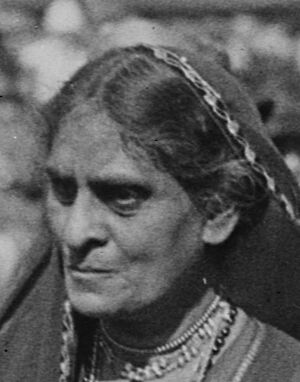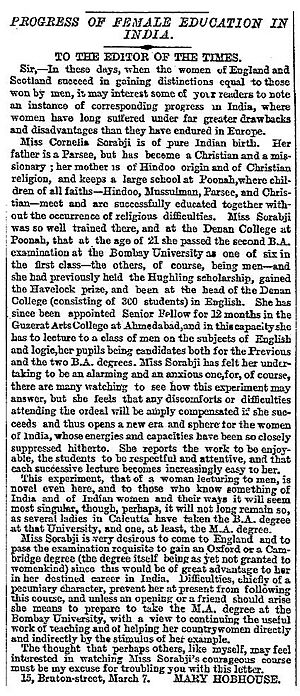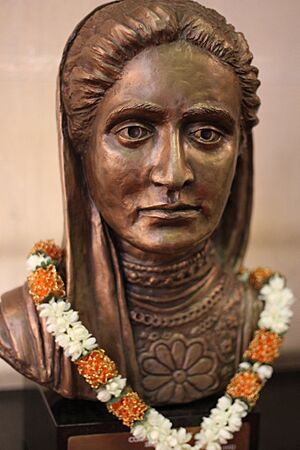Cornelia Sorabji facts for kids
Quick facts for kids
Cornelia Sorabji
|
|
|---|---|

Cornelia Sorabji, c. 1924
|
|
| Born | 15 November 1866 |
| Died | 6 July 1954 (aged 87) London, United Kingdom
|
| Alma mater |
|
| Occupation | Lawyer, social reformer, writer |
| Parent(s) |
|
| Relatives | Susie Sorabji (sister) Alice Pennell (sister) Richard Sorabji (nephew) |
Cornelia Sorabji (born November 15, 1866 – died July 6, 1954) was an amazing Indian lawyer, social reformer, and writer. She broke many barriers for women in her time. She was the first woman to graduate from Bombay University. She was also the first woman to study law at Oxford University in England.
After her studies, Cornelia returned to India. She started helping women who lived in purdah. These were women who were not allowed to talk to men outside their families. Many of these women owned property but couldn't get legal help. Cornelia wanted to defend them in court. However, as a woman, she was not allowed to practice law officially in India.
To change this, Cornelia worked hard. She took the law exams at Bombay University in 1897 and Allahabad High Court in 1899. This made her the first female advocate (a type of lawyer) in India. But it wasn't until 1923 that the law changed, allowing women to officially become barristers (another type of lawyer). Cornelia was also involved in groups that worked for social change. She believed that education was key for women to truly gain their rights.
Contents
A Young Pioneer: Early Life and Education

Cornelia Sorabji was born on November 15, 1866, in Nashik, a city in what was then British India. She was one of ten children. Her father, Reverend Sorabji Karsedji, was a Christian missionary. He played a big role in convincing Bombay University to let women study for degrees.
Cornelia's mother, Francina Ford, was also very inspiring. She helped start several girls' schools. Her mother's dedication to educating girls and helping those in need greatly influenced Cornelia.
Cornelia spent her childhood in different cities like Belgaum and Pune. She studied at home and at mission schools. She became the first woman student at Deccan College. She even got the highest marks in her final exams! This should have given her a scholarship to study in England. However, she was denied the scholarship. Instead, she worked as an English professor at Gujarat College, which was for men.
She became the first woman to graduate from Bombay University with a top degree in literature. In 1888, Cornelia asked for help to continue her education. Many kind people in England, including Florence Nightingale, helped raise money for her.
In 1889, Cornelia arrived in England. In 1892, she received special permission to take the advanced law exam at Somerville College, Oxford. This made her the first woman ever to do so. She was also the first woman allowed to read books at the Codrington Library at All Souls College, Oxford.
Breaking Barriers: Her Legal Career

When Cornelia returned to India in 1894, she focused on helping purdahnashins. These were women who lived in strict privacy and could not speak to men outside their families. Many of these women owned a lot of property. But they couldn't get legal advice because they couldn't meet male lawyers.
Cornelia was given special permission to speak for these women in some courts. But she couldn't officially represent them because women were not allowed to be lawyers. To change this, she took tough law exams in 1897 and 1899. She became the first female advocate in India. Still, it took until 1923 for the law to change, finally allowing women to practice law fully.
From 1902, Cornelia asked the British government in India to hire a female legal advisor. In 1904, she was appointed as a Lady Assistant to the Court of Wards in Bengal. By 1907, she was working in several provinces, helping women and children. Over 20 years, it's believed she helped more than 600 women and orphans with their legal problems, often for free. She wrote about these cases in her books.
In 1924, women were finally allowed to practice law in India. Cornelia started working in Calcutta. However, because of unfair treatment, she mostly prepared legal opinions. She wasn't often allowed to argue cases in court.
Cornelia retired from the high court in 1929. She moved to London but visited India in the winters. She passed away at her home in London on July 6, 1954, at the age of 87.
Working for Change: Social Reform
Cornelia was very interested in social service. She believed that change should happen carefully and not too quickly. She felt that until all women were educated, political changes wouldn't truly last. She also thought that Western ideas about women's rights shouldn't just be forced onto Indian society.
She was part of important groups like the National Council of Women in India. For her great service to India, she received the Kaisar-i-Hind Medal in 1909. Cornelia supported traditional Indian life and culture. But she also wanted to reform old Hindu laws, especially those about child marriage and the practice of Sati (where a widow would die on her husband's funeral pyre). She strongly believed that education was the real way to bring about social change.
Remembering Cornelia Sorabji
In 2012, a statue of Cornelia Sorabji was put up at Lincoln's Inn in London. This is a famous place for lawyers. On November 15, 2017, Google Doodle celebrated her 151st birthday, showing her picture to millions of people around the world.
See also
- First women lawyers around the world
- List of Parsis
 | Aaron Henry |
 | T. R. M. Howard |
 | Jesse Jackson |

